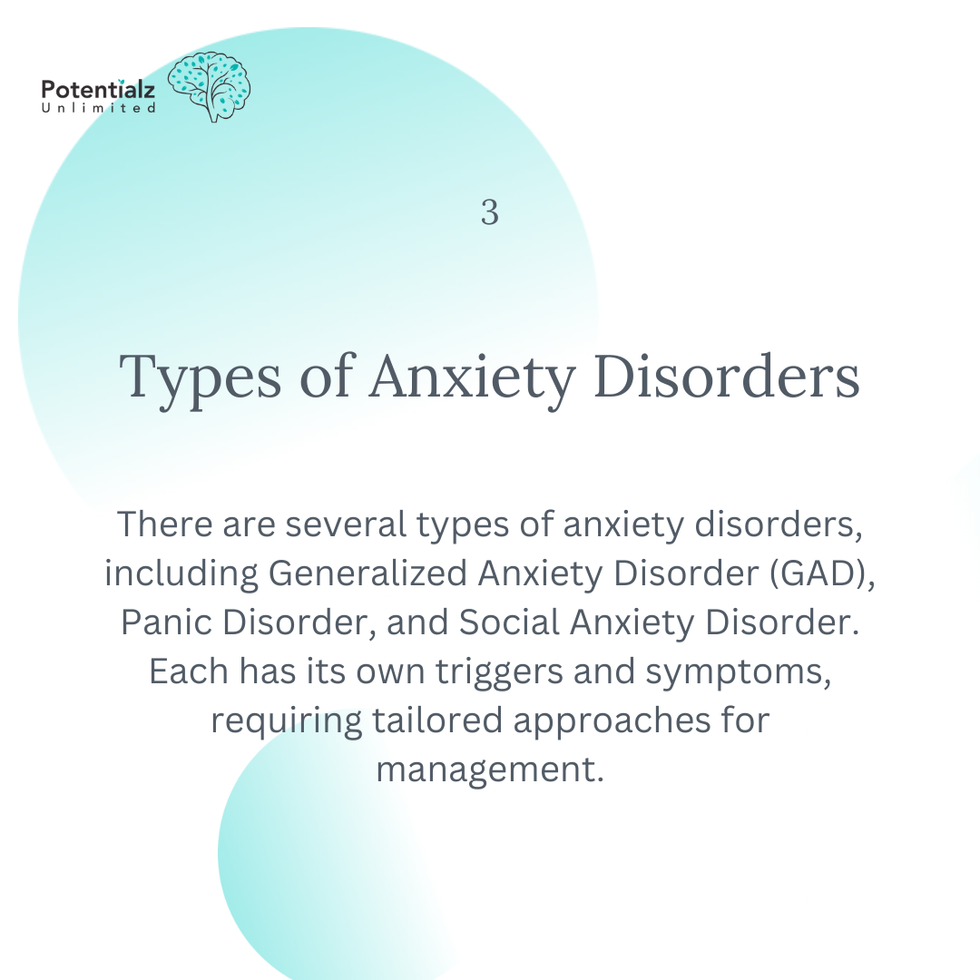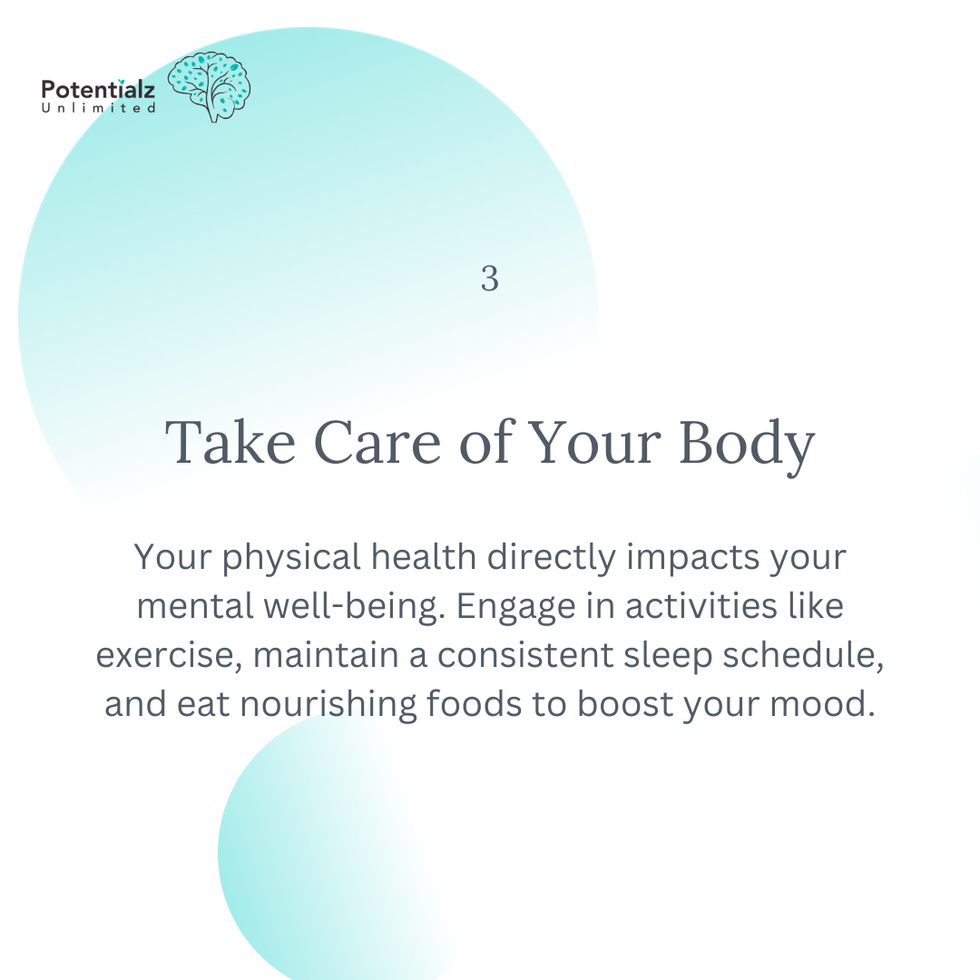Keeping Depression and Anxiety Away: A Guide for Young Minds
- Gurprit Ganda

- Mar 29
- 6 min read

Have you ever felt really sad or worried for a long time? That's what we call depression and anxiety. It's totally normal to feel down sometimes, but when those feelings stick around, it can be tough. The good news is that there are ways to feel better and keep those feelings from coming back. Let's talk about how to do that!
Understanding Depression and Anxiety
First, let's understand what depression and anxiety are. Depression is when you feel really sad, tired, and don't enjoy things you used to love. Anxiety is when you worry a lot about things, even small stuff, and it makes you feel scared or nervous. Both of these can make it hard to do everyday things like going to school or hanging out with friends.
When you start feeling better after being depressed or anxious, that's awesome! But sometimes, those feelings can come back. That's called a relapse. It's like when you get over a cold, but then catch it again later. We want to avoid that, right? So, let's learn how to keep those yucky feelings away!
Ways to Keep Depression and Anxiety Away
1. Keep Up with Your Treatment
If you're seeing a doctor or therapist, it's super important to keep going, even when you start feeling better. They're like your personal coaches for your mind! If you're taking medicine, don't stop without talking to your doctor first. It's like finishing all your antibiotics when you're sick - you need to complete the whole treatment to stay healthy.
2. Learn to Chill Out
Have you ever tried meditation or mindfulness? It's like giving your brain a mini-vacation. You can start with just a few minutes a day. Sit quietly, focus on your breathing, and let your thoughts float by like clouds. It might feel weird at first, but it gets easier with practice. This can help you feel calmer and more in control of your feelings.
3. Take Care of Your Body
Your body and mind are connected, like best friends. When your body feels good, your mind often follows. Here are some ways to keep your body happy:
Exercise: It doesn't have to be boring! Dance, play sports, or go for a bike ride. Moving your body releases happy chemicals in your brain.
Sleep Well: Try to go to bed and wake up at the same time every day. It's like setting a schedule for your brain to recharge.
Eat Healthy: Fruits, veggies, and whole grains are like superfoods for your mood. Don't forget to drink plenty of water too!
4. Hang Out with Friends and Family
Spending time with people you love is like a big, warm hug for your brain. Talk to your friends, play games with your family, or join a club at school. Having people around who care about you can make a huge difference when you're feeling down.
5. Learn New Ways to Deal with Stress
Life can be stressful sometimes, but there are cool ways to handle it:
Write in a Journal: It's like texting your feelings to yourself. Getting your thoughts out on paper can help you understand them better.
Try Relaxation Tricks: Take deep breaths, imagine your favorite place, or squeeze and relax your muscles. These can help you feel calmer when you're stressed.
Do Things You Love: Whether it's drawing, playing music, or building with Lego, doing something you enjoy can lift your mood.
6. Keep an Eye on Your Feelings
It's important to notice how you're feeling. You can use a mood tracker app or just write it down in a notebook. It's like being a detective of your own emotions! If you notice you're feeling sad or worried more often, it might be time to talk to someone about it.
7. Learn to Think Differently
Sometimes our brains can trick us into thinking negative things. Learning to spot these thoughts and change them can be super helpful. For example, if you think "I'm no good at anything," try to change it to "I'm still learning and getting better every day." It takes practice, but it can make a big difference in how you feel.
8. Make a Plan for Tough Times
It's smart to have a plan ready in case you start feeling bad again. Think of it like a fire escape plan, but for your feelings. Write down:
Who you can talk to when you're feeling down
Things that have helped you feel better in the past
Places you can go to feel safe and calm
Activities that cheer you up
Having this plan ready can make you feel more prepared and less scared about feeling bad again.
9. Remember It's Okay to Ask for Help
Sometimes, no matter how hard we try, we might start feeling down again. That's okay! It doesn't mean you failed. Asking for help is a brave and smart thing to do. Talk to your parents, a teacher you trust, or your doctor. They want to help you feel better.
10. Be Kind to Yourself
Imagine talking to yourself like you would to your best friend. You wouldn't be mean to them, right? So don't be mean to yourself! If you make a mistake or have a bad day, remind yourself that it's normal and you're doing your best.
What Depression and Anxiety Might Look Like
It's good to know what signs to look out for. Here are some things you might notice if depression or anxiety are coming back:
Feeling sad or worried most of the day
Not wanting to do things you usually enjoy
Having trouble sleeping or sleeping too much
Feeling really tired all the time
Having a hard time concentrating in school
Feeling irritable or angry more often
Changes in your appetite - eating more or less than usual
Thinking negative thoughts about yourself
Feeling nervous or scared about things that didn't bother you before
If you notice these signs lasting for more than a couple of weeks, it's a good idea to talk to someone about it.
Making Your Own Relapse Prevention Plan
Now that you know all these strategies, why not make your own plan to keep depression and anxiety away? Here's how you can do it:
List Your Warning Signs: Write down how you usually feel when you're starting to get depressed or anxious.
Identify Your Triggers: Think about what situations or events might make you feel bad. Is it stress from school? Problems with friends?
Write Down Your Go-To Strategies: What has helped you feel better in the past? Make a list of these things.
Create a Support Network: Who can you talk to when you're feeling down? Write down their names and how to contact them.
Plan Positive Activities: Make a list of things you enjoy doing that make you feel good.
Set Some Goals: Think about what you want to achieve to stay mentally healthy. Maybe it's exercising three times a week or talking to a friend every day.
Make a Daily Routine: Plan out your day to include healthy habits like regular meals, exercise, and relaxation time.
Have an Emergency Plan: Know what to do if you start feeling really bad. This might include calling a helpline or talking to your doctor.
Remember, your plan is unique to you. What works for your friend might not work for you, and that's okay! The important thing is to find what helps you stay happy and healthy.
Conclusion
Keeping depression and anxiety away takes some work, but it's totally worth it! By taking care of your body, learning to manage your thoughts and feelings, and knowing when to ask for help, you're giving yourself the best chance to stay mentally healthy.
Remember, having depression or anxiety doesn't define you. You're so much more than that! You're strong, you're brave, and you have the power to take control of your mental health. It's okay to have bad days sometimes - everyone does. The important thing is to keep trying and to be kind to yourself along the way.
If you ever feel like things are getting too tough to handle on your own, don't be afraid to reach out for help. There are lots of people who want to support you and help you feel better. You've got this!






















































Comments